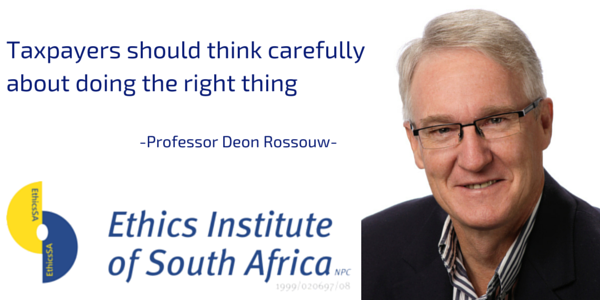|
In the wake of the first hike in personal income tax for 20 years the willingness of citizens to pay tax will be an indication of the strength of the social contract—the mutually beneficial agreement that commits government and citizens to work together to maintain a sustainable community.
“Tax morale—the willingness of citizens to pay their taxes—has sunk to new levels prompted by the small increase in personal tax plus an increase in other taxes such as the Road Accident Fund levy on the fuel price. The high levels of citizen unhappiness, and talk of a tax revolt, are an indication that our social contract is under strain,” says Professor Deon Rossouw, CEO of the Ethics Institute of South Africa (EthicsSA). “Government and citizens are both parties in this social contract, and both need to take decisive action to repair it.” The preface to a working paper on tax morale in developing countries for the Organisation of Economic Co-operation and Development (OECD), states “…at a deeper level, taxation and fiscal policy are at the core of every society’s social contract. Citizens pay their taxes in exchange for public services and goods”. The OECD goes on to make the critical point that this exchange legitimates the political dispensation and the state itself.* For the social contract to work, both parties have to honour their commitments. At present, though, citizens are beginning to question whether it is just to suffer additional taxes when the state is not fulfilling its part of the bargain. High levels of corruption, and fruitless and wasteful expenditure, coupled with sub-optimal service delivery are all prompting taxpayers to question the moral foundation of additional taxes. The perceived failure of the state to honour its obligations to taxpayers is worsened by the growing belief that the integrity of SARS, the tax-collection agency, has been compromised. Once seen as the cleanest and most effective organ of state, SARS is currently plagued by controversy—so much so that the Finance Minister has had to appoint an advisory committee to investigate. More worrying over the long term, though, are growing reports that SARS is becoming less even-handed in its treatment of taxpayers, and that individuals with powerful connections merit a different approach from SARS. Professor Rossouw points out that tax collection has to be seen to be fair, transparent and predictable in order to protect tax morale. This is particularly important given the far-ranging powers conferred on SARS to collect taxes it deems are owed. SARS officials find themselves in a position where they can be tempted to use their position to enrich themselves, thus making it imperative that the organisation ensure that its internal ethics is managed effectively. “Taxpayers who avoid paying their taxes are indeed guilty of putting the social contract at risk, and they should think carefully about doing the right thing. But, equally important, the state has to put its own house in order avoid tax revolt by citizens, and thus a breakdown of the social contract,” Professor Rossouw concludes. * Christian Daude, Hamlet Gutiérrez and Ángel Melguizo, “What drives tax morale?”, Working paper No. 315, OECD, available at http://www.oecd.org/dev/americas/WP315%20AE.pdf. ENDS MEDIA CONTACT: Juanita Vorster, 079 523 8374, [email protected], www.atthatpoint.co.za For more information on EthicsSA please visit: Website: www.ethicssa.org LinkedIn: Ethics Institute of South Africa Facebook: Ethics Institute of South Africa Comments are closed.
|
Welcome to the newsroom of The Ethics Institute. For media releases prior to August 2014 please click here.
Archives
August 2017
Categories
All
|


 RSS Feed
RSS Feed